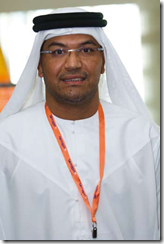The reporting of Q4 and full-year financial results for 2009 has been a highly anticipated time given the economic turbulence experienced during the course of last year. A sample of results from the region and other emerging markets confirms the resilience of the telecom sector, driven mainly by mobile and broadband operations, and augers well for the year ahead as operators seek to drive new revenue streams
The difficult operating year that 2009 was is likely to have a long-term positive effect on operators in emerging markets; teaching them how best to manage costs and streamline operations. For operators in the Middle East and Africa, 2009 proved to be a year in which top-line growth may have slowed or flattened somewhat, while with more cost efficient ways in which to deliver services, profit and margins continued to grow.
Etisalat for example reported group net profit of AED 8.84 billion (US$2.41 billion) for 2009, up 3.8 per cent from AED 8.51 billion in 2008. This sum included profit on the sale of shares in Saudi subsidiary Mobily of AED 892 million after federal royalty. Net revenues grew five per cent from AED 29.36 billion in 2008, to AED 30.83 billion last year.
“These results highlight that Etisalat has followed the correct strategy by following a selective policy in our international investments,” commented Mohammed Omran, chairman of Etisalat. “In this way, we have made use of the current financial environment to identify the brightest opportunities that have arisen as a result of this situation.”
Etisalat’s Saudi Arabia subsidiary Mobily reported net profit of SAR 3.014 billion (US $804 million) for 2009, up 44 per cent year-on-year. Annual gross revenues increased 21 per cent to SAR 13.058 billion.
Mobily attributed its strong EBITDA margin of 37.04 per cent to the growing contribution made from higher margin data revenues, high-spending post-paid subscribers and improved efficiencies.
Mobile broadband revenue based on HSPA technology increased 159 per cent from the previous year, while wholesale revenues represented by sales to third parties increased 470 per cent from 2008.
The operator counts over one million mobile broadband customers subscribed to high usage bundles and with an overall mobile data exchange exceeding 50 terabytes per day, has the busiest HSPA network in the world. Data revenues contributed 14 per cent to overall revenues in 2009, compared to nine per cent the previous year.
 Mobily CEO Khalid Al Kaf presides over an operator that generates some of the highest mobile data usage per subscriber anywhere in the world
Mobily CEO Khalid Al Kaf presides over an operator that generates some of the highest mobile data usage per subscriber anywhere in the world
Mobily’s net profit for the fourth quarter amounted to SAR 1.052 billion, a 35 per cent increase from SAR 778 million year-on-year, and a 30.4 per cent increase from SAR 807 million quarter-on-quarter. During the year the operator
also refinanced a SAR 1.5 billion loan and raised a SAR 900 million loan to extend its infrastructure. Both of these financing packages were achieved in the face of constrained liquidity and financial institutions being risk-adverse.
Batelco Group, the company that Peter Kaliaropoulos has transformed in the past three years of his tenure as CEO recorded stellar results, achieving its highest ever annual net profit of BD105 million (US $278.5 million), on the back of record gross revenues across its seven operations of BD346.9 million. This represented a nine per cent increase year-on-year, with net revenues growing by eight per cent to BD268.7 million.
Group chairman Sheikh Hamad bin Abdulla Al Khalifa said the company’s strategy to offer a full range of communication services to customers in Bahrain, as well as growing in its regional markets – Jordan, Egypt, Kuwait, Yemen, Saudi Arabia and India – were the company’s main success factors in 2009.
“We have maintained our market leadership in Bahrain, continued to grow across the Middle East region and got off to a successful start in India, despite the highest competitive intensity in every market in which we operate,” commented Sheikh Hamad.
Kaliaropoulos said the company managed its costs carefully and delivered record EBITDA of BD153 million. Batelco’s overseas operations contributed 31 per cent of gross revenues and 22 per cent of EBITDA, adding that all Batelco’s business operations delivered within business plan expectations for the year.
Batelco’s latest mobile venture, STel in India, launched at the beginning of December and has since garnered a subscriber base of 450,000 customers.
“We also launched, together with Atheeb, our new broadband and voice services in Saudi Arabia under the Go brand, the first company to offer very credible 4G services and challenge the incumbent operator,” Kaliaropoulos stated.
Batelco’s Jordan mobile operation Umniah had a market share year-end of 27 per cent, with 1.65 million GSM subscribers, 9,000 WiMAX customers and 9,000 ADSL lines.
However, Bahrain remains the most important market for the group. Active mobile subscribers reached 822,000, broadband crossed 85,000 customers and there were 200,000 fixed lines as of the end of 2009.
Looking at the wider emerging market landscape, Vodafone Group remains a good benchmark to estimate market conditions in wider regions. The operator reported revenues for the fourth quarter 2009 (third fiscal) increased by 10 per cent to £11.5 billion (US$18.37 billion). The company expects that adjusted operating profit for 2010 will be in the upper end of its forecast range and lifted its free cash flow range by £500 million after it said its cost cutting programme was on track.
Free cash flow increased by 15.6 per cent to £1.8 billion driven, in part, by Verizon Wireless dividends. Group net debt decreased by £2.3 billion in the quarter to £31.7 billion, reflecting free cash flow generated and a £600 million beneficial impact of exchange rate movements on non-sterling denominated debt.
“Service revenue trends have improved with continuing growth in our data and fixed line revenue,” commented Vittorio Colao, CEO of Vodafone Group. “Free cash flow guidance has been raised reflecting the impact of our cost and working capital reduction programmes. We are on track to deliver on our strategic priorities in the current financial year.”
The proportionate mobile customer base reached 333 million with 10.3 million net additions during the quarter.
Group data revenue exceeded £1 billion for the first time, up 17.7 per cent year-on-year, with increased take up of data-enabled smartphones across Europe where active data users now exceed 30 million. Data as a percentage of service revenue in Europe was just 11 per cent, increasing for the sixth consecutive quarter.
 Vodafone Group CEO Vittorio Colao says the operator is on track to deliver on its strategic priorities in the current financial year
Vodafone Group CEO Vittorio Colao says the operator is on track to deliver on its strategic priorities in the current financial year
Fixed line revenue grew by 10 per cent to £862 million in the quarter with strong broadband customer growth; the European broadband customer base now exceeds five million. Revenue grew by 4.1 per cent in Germany, 22.3 per cent in Italy and 10.7 per cent in Spain.
Capital expenditure of £1.3 billion was at a similar level to the same quarter last year reflecting continued investment in Europe to support network quality and data growth and targeted lower investment in India consistent with previous guidance.
Vodafone country breakdown – other Africa and Central Europe:
Service revenue declined by 6.8 per cent as growth in Turkey was more than offset by revenue declines in other markets in the region. Turkey returned to growth in Q4 with service revenue increasing by 12.9 per cent driven by incoming mobile voice revenue and an improving trend in outgoing mobile voice revenue. Vodafone continues to be the market leader in mobile number portability, which contributed to a substantial increase in the contract customer base. Turkey continued to invest in improving both network quality and coverage and significantly expanded its distribution channels. In Romania, service revenue declined by 23.8 per cent, with voice revenue declining by 24.7 per cent as competition remained intense and new promotional deals resulted in lower effective pricing.
India:
Service revenue grew by 13.8 per cent, including a 6.9 percentage point benefit from the revenue stream generated by the network sharing joint venture Indus Towers. The growth rate was lower than the previous quarter primarily due to pressure on voice pricing in what is becoming an increasingly competitive market. The impact of the 51 per cent increase in average mobile customers was largely offset by lower effective prices. Indus Towers continued to show improved performance with tenancy rates up to an average of 1.7 operators per site.
Other Asia Pacific and Middle East:
Service revenue increased by 5.8 per cent driven primarily by the growth in Qatar and Egypt. Having launched services in July 2009 Qatar more than doubled its mobile customer base in the quarter to 354,000 customers at December 31, 2009, representing 22 per cent of the population. In Egypt service revenue increased by 2.7 per cent following an increase in the average mobile customer base and strong data revenue growth resulting from increased penetration of mobile Internet devices. These factors were partially offset by aggressive competition and pricing deregulation in the market. The group’s joint venture in Australia is performing well and delivering cost synergies in line with management’s expectations.
Vodacom:
Service revenue grew by 5.5 per cent with continued robust performance in South Africa offsetting service revenue declines in Tanzania and the Democratic Republic of Congo. Data revenue continued to increase strongly with growth of 36.1 per cent following increased penetration of mobile PC connectivity devices and mobile Internet usage. Customer growth in the South African market continued to be impacted by customer registration requirements. Service revenue declined in Tanzania and the Democratic Republic of Congo reflecting price reductions aimed at improving competitiveness in key markets and a challenging economy in the Democratic Republic of Congo.






0 comments ↓
There are no comments yet...Kick things off by filling out the form below.
Leave a Comment